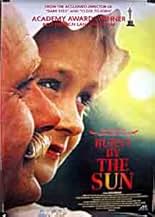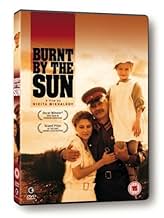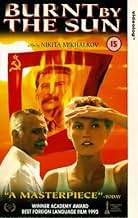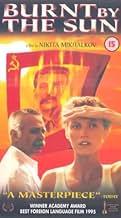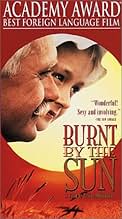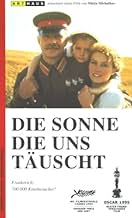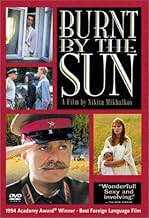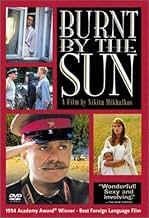NOTE IMDb
7,8/10
17 k
MA NOTE
L'été 1936 en URSS. Kotov, héros de la révolution bolchévique passe une journée de repos dans sa datcha avec sa femme Maroussia et leur fille Nadia. La révolution l'avait renvoyé loin et dép... Tout lireL'été 1936 en URSS. Kotov, héros de la révolution bolchévique passe une journée de repos dans sa datcha avec sa femme Maroussia et leur fille Nadia. La révolution l'avait renvoyé loin et dépouillé de tout. Les souvenirs ont un goût amer.L'été 1936 en URSS. Kotov, héros de la révolution bolchévique passe une journée de repos dans sa datcha avec sa femme Maroussia et leur fille Nadia. La révolution l'avait renvoyé loin et dépouillé de tout. Les souvenirs ont un goût amer.
- Réalisation
- Scénario
- Casting principal
- Récompensé par 1 Oscar
- 4 victoires et 9 nominations au total
Ingeborga Dapkunaite
- Marusya
- (as Ingeborga Dapkunayte)
Nadezhda Mikhalkova
- Nadya
- (as Nadya Mikhalkova)
André Oumansky
- Filipp
- (as Andre Umanskiy)
Avis à la une
Despite its dark subject matter, this is a very positive and heart warming movie. It shows Stalinism without the Western propaganda, through the lens of great Soviet people that made everything good even under Stalin possible. An ode of love to the great Russian and Soviet nation. Definitely recommended.
"Burnt by the Sun" is a powerful example of what a genuinely Russian movie can be when it uses the good sides of western film-making : a coherent plot, professional camera work, and freedom of expression, all things that were rare for the cinema of Soviet times. Of course, it is not surprising that it was made by Nikita Mikhalkov, one of the few Russian directors who achieved lasting world success during communism, and therefore he had the right contacts abroad to get a decent budget. Though, "Burnt by the Sun" is way better than Mikhalkov's pompous "Barber of Siberia", which was alloted more money than any other film in the history of Russian cinema.
In "Burnt by the Sun", Mikhalkov was able to give us a palpable feeling of the beauty and genius of Russia. The lighting is magnificent all the way through, and the ripe and wide wheat fields shine like gold. The action takes place in a cozy dacha among the birch trees, a house which seems to be the nest of a bunch of gentle and carefree eccentrics, all in an atmosphere that reminds pleasantly of Tchekov.
Yet, you can tell from the start that "Burnt by the Sun" is not going to be just a comedy, as the first scene opens on a man cutting his veins in a bathtub while the telephone is ringing. However, this first forewarning soon gets forgotten throughout most of the film, which keeps a warm, light-hearted, slightly nostalgic tone almost all the time. It is only towards the middle you realize that it starts looming slowly towards predictable tragedy, and this only gets obvious in the very last moments.
It turns out that the characters we see are all members of an old aristocratic family who were spared the horrors of the revolution because the younger daughter, Marusia, married a Red Army colonel, much older than she is. Thus, they keep on living as they ever did, playing cards, drinking tea from samovars, making private jokes in French. They even have a maid and a parrot. They seem totally oblivious of the reality around them. Except for innocent looking balloons with Stalin's face on them and a few parading pioneers, the communist regime is visible almost only through the presence of colonel Kotov, brilliantly played here by Nikita Mikhalkov himself.
Colonel Kotov impersonates a character very familiar to the Russian mentality : he is tall, strong, authoritarian, but at the same time protective, warm-hearted, charming and prone to jokes. He is about just as sympathetic as the gruff milkman with a heart of gold in "Fiddler on the Roof". Although he is a military, he is not the kind of guy you think as having blood on his hands. But of course Lenin and Stalin's aura over Russian people was also partly due to the fact that they represented strong and protective father figures.
The story takes a sudden turn with the arrival of an enigmatic character disguised as a Santa Claus in the middle of summer. He turns out to be known by everyone in the house, as he is the adoptive child of the late grandfather. In fact, he was Marusia's childhood companion, and her lover in the first place, but was evicted by Kotov, who protected henceforth the whole family from repression. It soon becomes clear that the man, called Mitya, has come to take revenge for his shattered life.
All performances here are good, even though Nikita Mikhalkov, as an actor, still manages to steal the show. But one will not either forget the performance of his then six-year old daughter Nadya , who also plays his daughter in the movie. A charming, energetic and witty child performance which impersonates the innocence of the family about to be lost.
The French title for the movie was "Deceitful Sun", and I find it more appropriate. Although the film bathes in quiet sunlight, it deals with one of the darkest eras of Russian/Soviet history : Stalinism. In the early 1930's, Stalin decided to eliminate much of the newly arisen communist elite whom he did not trust anymore, and hired former enemies of communism, or half-criminals, to eradicate his own official allies. Thus, colonel Kotov remains self-righteous and sure of himself almost until the end because he simply cannot believe that Stalin will not protect him.
Needless to say that "Burnt by the Sun" is one of the first Russian movies that deals so openly with the subject. A subject which still remains quite sensitive since millions of people had their lives shattered by those events. Unlike what happened for Nazism, it was not until the end of the communist regime that it was possible to discuss it openly, even though Stalin's deeds had already been condemned officially a long time before. Therefore, this superb drama is also the symbol of a historical breakthrough.
In "Burnt by the Sun", Mikhalkov was able to give us a palpable feeling of the beauty and genius of Russia. The lighting is magnificent all the way through, and the ripe and wide wheat fields shine like gold. The action takes place in a cozy dacha among the birch trees, a house which seems to be the nest of a bunch of gentle and carefree eccentrics, all in an atmosphere that reminds pleasantly of Tchekov.
Yet, you can tell from the start that "Burnt by the Sun" is not going to be just a comedy, as the first scene opens on a man cutting his veins in a bathtub while the telephone is ringing. However, this first forewarning soon gets forgotten throughout most of the film, which keeps a warm, light-hearted, slightly nostalgic tone almost all the time. It is only towards the middle you realize that it starts looming slowly towards predictable tragedy, and this only gets obvious in the very last moments.
It turns out that the characters we see are all members of an old aristocratic family who were spared the horrors of the revolution because the younger daughter, Marusia, married a Red Army colonel, much older than she is. Thus, they keep on living as they ever did, playing cards, drinking tea from samovars, making private jokes in French. They even have a maid and a parrot. They seem totally oblivious of the reality around them. Except for innocent looking balloons with Stalin's face on them and a few parading pioneers, the communist regime is visible almost only through the presence of colonel Kotov, brilliantly played here by Nikita Mikhalkov himself.
Colonel Kotov impersonates a character very familiar to the Russian mentality : he is tall, strong, authoritarian, but at the same time protective, warm-hearted, charming and prone to jokes. He is about just as sympathetic as the gruff milkman with a heart of gold in "Fiddler on the Roof". Although he is a military, he is not the kind of guy you think as having blood on his hands. But of course Lenin and Stalin's aura over Russian people was also partly due to the fact that they represented strong and protective father figures.
The story takes a sudden turn with the arrival of an enigmatic character disguised as a Santa Claus in the middle of summer. He turns out to be known by everyone in the house, as he is the adoptive child of the late grandfather. In fact, he was Marusia's childhood companion, and her lover in the first place, but was evicted by Kotov, who protected henceforth the whole family from repression. It soon becomes clear that the man, called Mitya, has come to take revenge for his shattered life.
All performances here are good, even though Nikita Mikhalkov, as an actor, still manages to steal the show. But one will not either forget the performance of his then six-year old daughter Nadya , who also plays his daughter in the movie. A charming, energetic and witty child performance which impersonates the innocence of the family about to be lost.
The French title for the movie was "Deceitful Sun", and I find it more appropriate. Although the film bathes in quiet sunlight, it deals with one of the darkest eras of Russian/Soviet history : Stalinism. In the early 1930's, Stalin decided to eliminate much of the newly arisen communist elite whom he did not trust anymore, and hired former enemies of communism, or half-criminals, to eradicate his own official allies. Thus, colonel Kotov remains self-righteous and sure of himself almost until the end because he simply cannot believe that Stalin will not protect him.
Needless to say that "Burnt by the Sun" is one of the first Russian movies that deals so openly with the subject. A subject which still remains quite sensitive since millions of people had their lives shattered by those events. Unlike what happened for Nazism, it was not until the end of the communist regime that it was possible to discuss it openly, even though Stalin's deeds had already been condemned officially a long time before. Therefore, this superb drama is also the symbol of a historical breakthrough.
You know, here, in Moscow, the critics do their best to show that Nikita Mikhalkov makes popular pictures which aren't to be considered serious. To hear that "The Barber of Siberia" is a stupid sentimental movie is quite common nowadays.
But the more time passes from his next in turn production, the more a "strange" effect seems to take place: his films at last are rated according to their true value and not to somebody's opinion about them. It is always hard to say that something new is really good, but some time later...
"Utoml'ennye Solntsem" is not a very emotional movie. I don't suppose you'd cry when watching it. But my opinion is that it's a brilliant one. It is historically authentic (I've studied that period of time quite carefully so I think I have a right to say so). And no-one on this site seems to notice the love story in the film, which actually brought about the whole tragedy (remember, Kotov made Mitya work for NKVD). It was marvellously played by Oleg Men'shikov (my favourite actor) and Ingeborga Dapkunaite, a remarkable Lithuanian actress. And Mikhalkov himself, of course - "Kot" means "cat", by the way. Many people endow him with the characteristics of Kotov which only shows that he played his role well. A good actor is always attributed his character's traits.
But still, for me the main feature of the film is the world of Mitya's soul created by Men'shikov. A young, talented boy with brilliant prospects is what Mitya was. He gets involved in the war, goes through many ordeals, then comes home and falls in love with the girl he knew from her very birth, Marousya. But their happiness is too short. He is given a choice: to work for NKVD or...to commit suicide. He's only 24, and he wants to live. But hope for future slowly disappears as life goes on, cruel and senseless. When Mitya appears on the dacha of Marousya's parents, his soul is almost a wreck. But the last chance is killed when he sees that, after a suicide attempt, after months of despair, Marousya has married Kotov and doesn't want to go through everything again. Therefore Mitya begins to fulfill his revenge.
But the more time passes from his next in turn production, the more a "strange" effect seems to take place: his films at last are rated according to their true value and not to somebody's opinion about them. It is always hard to say that something new is really good, but some time later...
"Utoml'ennye Solntsem" is not a very emotional movie. I don't suppose you'd cry when watching it. But my opinion is that it's a brilliant one. It is historically authentic (I've studied that period of time quite carefully so I think I have a right to say so). And no-one on this site seems to notice the love story in the film, which actually brought about the whole tragedy (remember, Kotov made Mitya work for NKVD). It was marvellously played by Oleg Men'shikov (my favourite actor) and Ingeborga Dapkunaite, a remarkable Lithuanian actress. And Mikhalkov himself, of course - "Kot" means "cat", by the way. Many people endow him with the characteristics of Kotov which only shows that he played his role well. A good actor is always attributed his character's traits.
But still, for me the main feature of the film is the world of Mitya's soul created by Men'shikov. A young, talented boy with brilliant prospects is what Mitya was. He gets involved in the war, goes through many ordeals, then comes home and falls in love with the girl he knew from her very birth, Marousya. But their happiness is too short. He is given a choice: to work for NKVD or...to commit suicide. He's only 24, and he wants to live. But hope for future slowly disappears as life goes on, cruel and senseless. When Mitya appears on the dacha of Marousya's parents, his soul is almost a wreck. But the last chance is killed when he sees that, after a suicide attempt, after months of despair, Marousya has married Kotov and doesn't want to go through everything again. Therefore Mitya begins to fulfill his revenge.
Having read all of the negative commentaries on this film, I would first like to point out that severely criticising the period of Soviet history in which Utoml'ennye Solntsem takes place, and in that effort, condemning the people of that era such as are portrayed in this film as being entirely culpable for their actions, is all very well and good to do from hindsight, and from the safety of a soft computer chair in the modern-day West. Because of course, no one is tortured today in the West for a casual remark against the reigning despot; nor do we live under the threat that our families may be sent off to Siberia as one of the consequences of our actions, great or trivial. I myself can't say what I would have been willing to do under the circumstances that existed during the time of the Soviet purges, whom I would have betrayed just to survive, or if I would have the courage to make some kind of moral, social, or political stand, and if I think I could have? Well,if we all admit it to ourselves, we know that torture will break any man eventually... In watching this film, I think that we should keep in mind that we are not necessarily here to judge but to take the director's journey to another time and place: and yet we should still be able to remember and respect the fact that what we are seeing here is a piece of the history that lies beneath the modern day Russia. This history is a shadow that has cast its pall over the lives of every Soviet citizen since then, including Mikhalkov. The fear of the purges that swept over the Soviet Union during the 1930's and 40's is a kind of fear that will fade, but never die away entirely. So, what can be the point in overly criticising Mikhalkov or any one in the former USSR for surviving under the system as it was before glasnost, knowing what they knew of the state and the full extent of what it could do and had already done (Stalin's purges may even have claimed 20-40 million lives)? If Utoml'ennye Solntsem is Mikhalkov's attempt to exonerate his "cooperation" with the Soviet system within his own time, what has he really got to vindicate or to feel guilty about? That being said, and despite the fact that numerous films, books, and media have copiously used this subject to tell a story, it is not a subject which can be exhausted but a rich treasure of unusual human experiences. And, as some have pointed out, this film is far more than just a story of revolutionary politics or a tale of betrayal: it IS a love story, between men and women, and between men and their motherland. Moreover, I was sincerely moved by the love triangle between Marussya, Mitya, and Kotov. Utoml'ennye Solntsem is not, however, a film that will make you laugh often, and would not at all were it not for the undeniable charm of the bold little Nadya. Utoml'ennye Solntsem will make those who appreciate the tragic element within history, and in particular, this era of political turmoil, shed more than a few tears. Because the truth lingers behind this tale, the truth of a time which was a nightmare few of us can imagine... or would want to. In my opinion, the great thing about this film is that it throws us back for a while into that era and portrays what was good about it, what remains good, despite all obstacles; the film is a tale of love that survives the most extreme of human conditions. It is fascinating and compelling, brave and tender, horrifying, and real. Not for everyone, but certainly a masterpiece within its genre.
9=G=
"Burnt by the Sun" glides effortlessly, seamlessly though the genres as it tells of a handful of Russian characters who collectively constitute a family of sorts with great humor and drama, poignant and sweetly sentimental moments, and excellence both technically and artistically. What is more, the film's story is interesting, unpredictable, and well told with depth and thoroughly developed characters.
The much which has been written about the politics of the our time, the Oscar award and the bravura with which it was accepted, etc. is much ado about nothing. This is a movie. This is art and entertainment. And, when taken for what it is, "Burnt by the Sun" is truly a masterpiece.
The much which has been written about the politics of the our time, the Oscar award and the bravura with which it was accepted, etc. is much ado about nothing. This is a movie. This is art and entertainment. And, when taken for what it is, "Burnt by the Sun" is truly a masterpiece.
Le saviez-vous
- AnecdotesOne of four Russian films ever to win Academy Award for Best Foreign Language Film. The others are Guerre et paix (1965), Dersou Ouzala (1975) and Moscou ne croit pas aux larmes (1980)
- ConnexionsFeatured in Namedni 1961-2003: Nasha Era: Namedni 1995 (1999)
- Bandes originalesUtomlennoe solntse
Written by Jerzy Petersburski (as Ezhi Petersburgskiy)
Lyrics by Iosif Alvek (uncredited)
Performed by Mark Simkin (singer), Efim Vyshkin (violin), Aleksandr Bashkatov (bayan), and Viktor Agapov (guitar)
Played by an instrumental quartet during opening credits as a film's theme song
Meilleurs choix
Connectez-vous pour évaluer et suivre la liste de favoris afin de recevoir des recommandations personnalisées
- How long is Burnt by the Sun?Alimenté par Alexa
Détails
- Date de sortie
- Pays d’origine
- Site officiel
- Langues
- Aussi connu sous le nom de
- Burnt by the Sun
- Lieux de tournage
- Sociétés de production
- Voir plus de crédits d'entreprise sur IMDbPro
Box-office
- Budget
- 2 800 000 $US (estimé)
- Montant brut aux États-Unis et au Canada
- 2 302 338 $US
- Week-end de sortie aux États-Unis et au Canada
- 60 074 $US
- 23 avr. 1995
- Montant brut mondial
- 2 313 461 $US
- Durée2 heures 15 minutes
- Couleur
- Mixage
- Rapport de forme
- 1.66 : 1
Contribuer à cette page
Suggérer une modification ou ajouter du contenu manquant

Lacune principale
By what name was Soleil trompeur (1994) officially released in India in English?
Répondre

